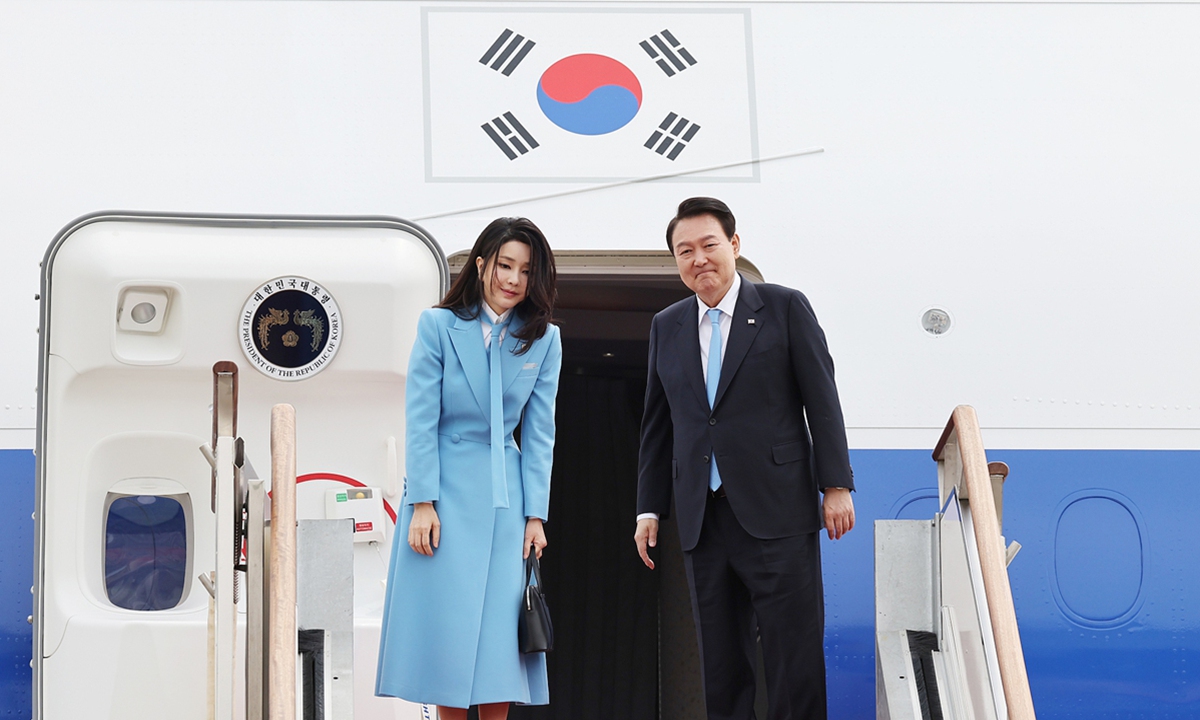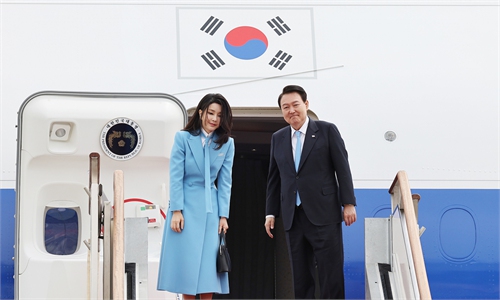
South Korean President Yoon Suk-yeol (right) and his wife Kim Keon-hee board a plane as they leave for Washington on April 24, 2023. Photo: VCG
South Korean President Yoon Suk-yeol said in an interview with The Washington Post on Monday that he cannot accept the notion that Japan "must kneel because of our history 100 years ago." He also stated that South Korea's security concerns were too urgent to delay cooperation with Tokyo, though some critics would never be convinced.
Yoon's remarks indicate the basic thinking of the conservative parties in South Korea who advocate facing the future and strengthening cooperation with the US and Japan. Making such controversial comments during his visit to the US, Yoon was eagerly seeking courtship with Washington.
A Chinese observer pointed out that the Yoon administration's views are not representative of South Korea, noting that such remarks only reflect the opinion of some conservatives and pro-US and pro-Japan forces, which are unacceptable to the majority of the Korean people.
It is short-sighted for Yoon to seek a convenient alliance with the US and Japan by disregarding history to achieve a so-called security arrangement, which will be harmful to the security of South Korea and the region. As a result, distrust of the government in South Korea will continue to grow, the observer noted.
On March 6, Seoul announced a plan to compensate Koreans who performed forced labor during Japan's colonial rule, and Yoon later visited Japan. He originally intended to showcase his diplomatic achievements and boost public support by improving relations with Japan. However, in reality, Japan did not respond positively to this.
After visiting Japan, Yoon faced fierce criticism at home where the compensation plan was regarded as nothing more than a unilateral humiliating compromise that undermined national dignity. In addition, the Yoon administration's weak response to the recent US' surveillance incident has further eroded its popularity. A recent poll conducted by Gallup Korea shows that the administration's approval rating fell below 30 percent for the first time in five months.
Xiang Haoyu, a research fellow at the China Institute of International Studies, said that Yoon's remarks demonstrate his lack of a correct understanding of public opinion. He blindly caters to the US and Japan based on his conservative political beliefs. In fact, he lacks a keen sense as a politician, as well as an understanding of the security environment of his own country, the complex historical background of the Korean Peninsula and the strategic dynamics among major powers in the region.
Seoul under the leadership of Yoon has bowed to Japan to please Washington. This is not only unpopular at home, but also has hurt the hearts of Asian countries that were once invaded by Japan. Such a blatant disregard for the feelings of the Korean and other Asian peoples is sure to face strong resistance. A security plan of "pain for kinsfolk and pleasure for enemies" is of no benefit to South Korea itself or to the overall situation on the Korean Peninsula.
Prior to his visit to the US, Yoon also made provocative comments targeted at Russia and China, triggering strong reactions. His pro-US diplomacy will only bring great risks to the Korean Peninsula, and South Korea may become a bullet for the US to attack other countries.
Such moves have made South Korea lose its flexibility in handling major power relations. The country is blindly following the US, and as a result it has damaged its relations with other countries in the region. The idea of protecting the so-called national security by strengthening its alliance with the US and Japan has actually brought more insecurity and crises to South Korea, which has finally completely lost South Korea's autonomy.
The "award" from the US is likely to be more illusory than real in the end. After all, before Yoon kicked off his visit to the US, Washington gave a big slap in the face of him, demanding that Seoul not fill China gaps if Beijing bans Micron chips. The US has always put "America First" and will not consider Seoul's interests too much. It will be difficult for Yoon to gain substantive benefits for South Korea's national interests during his US' trip.
At home, Yoon will face growing dissatisfaction. Abroad, the trend of the Yoon administration blatantly leaning toward and catering to Washington will further highlight the inequality between the US and South Korea, and the "dominant-subordinate" structure of the US and South Korea will become more prominent.

